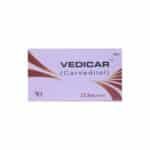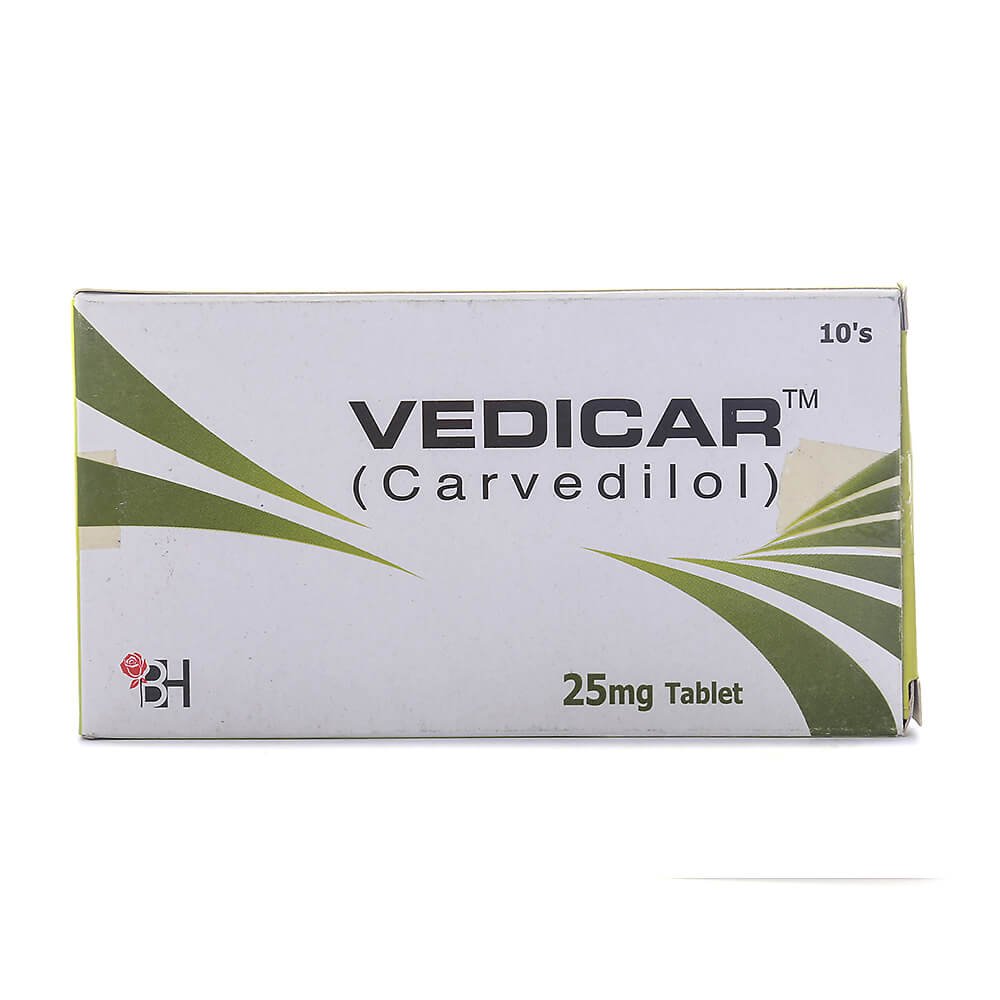delivery within 72 Hours
Vedicar 25mg Tablet
₨ 217
Generic: Carvedilol
Pack Size: 10s
Product Form: Tablet
Delivery within: 2 to 3 working days across Pakistan
Shipping & Delivery
-
Courier delivery
Our courier will deliver to the specified address
2-3 Days
From Rs 250
-
Free 15-Day returns

Black Friday Blowout!
Description
Vedicar 25mg Tablet contains the active ingredient Carvedilol, which belongs to a class of medications known as beta-blockers. It is primarily used to manage various cardiovascular conditions, including hypertension (high blood pressure), heart failure, and certain heart rhythm disorders.
Key Ingredient and Its Benefits:
- Carvedilol: This medication works by blocking the action of certain natural substances in the body, such as adrenaline, which can increase heart rate and blood pressure. By blocking these substances, carvedilol helps to relax blood vessels, lower blood pressure, and improve heart function.
Uses:
Vedicar 25mg Tablet is indicated for the following purposes:
- Treatment of hypertension to lower blood pressure and reduce the risk of heart attacks, strokes, and other cardiovascular events.
- Management of chronic heart failure to improve symptoms, increase survival, and reduce the need for hospitalization.
- Control of left ventricular dysfunction following a heart attack to reduce the risk of further cardiovascular events.
Dosage and Administration:
The dosage of Vedicar 25mg Tablet is determined by the patient’s medical condition, response to treatment, and other factors as determined by the prescribing healthcare provider. It is usually taken orally with or without food, as directed. The dosage may be gradually increased over time to achieve the desired therapeutic effect.
Precautions:
- Before using Vedicar 25mg Tablet, inform your healthcare provider about any pre-existing medical conditions, allergies, or medications you are currently taking.
- Use caution when driving or operating machinery, as carvedilol may cause dizziness, drowsiness, or blurred vision.
- Avoid sudden discontinuation of carvedilol without consulting your doctor, as it may lead to worsening of symptoms or rebound hypertension.
Side Effects:
Common side effects of Vedicar 25mg Tablet may include dizziness, fatigue, low blood pressure, slow heart rate, and diarrhea. Less common but more severe side effects may include shortness of breath, swelling of the ankles or legs, fainting, or chest pain. Contact your healthcare provider if you experience any persistent or severe side effects.
FAQs:
- How long does it take for Vedicar to lower blood pressure? The onset of action of Vedicar may vary, but significant reductions in blood pressure may be observed within a few hours to days of starting treatment. However, it may take several weeks to achieve the full therapeutic effect.
- Can Vedicar be used for other heart conditions besides hypertension and heart failure? Vedicar may be used for other heart conditions under the supervision of a healthcare provider, such as angina (chest pain) or arrhythmias (irregular heartbeats). The dosage and administration should be determined based on the specific condition and individual patient characteristics.
- Is Vedicar safe for use during pregnancy or breastfeeding? Vedicar should be used during pregnancy or breastfeeding only if clearly needed and under the guidance of a healthcare provider. The potential benefits and risks should be carefully evaluated before use in pregnant or breastfeeding women.
- Can Vedicar interact with other medications? Yes, Vedicar may interact with certain medications, including other antihypertensive drugs, beta-blockers, and medications that affect heart rhythm. Inform your healthcare provider about all medications you are currently taking before starting Vedicar.
- What should I do if I miss a dose of Vedicar? If you miss a dose of Vedicar, take it as soon as you remember. However, if it is almost time for your next dose, skip the missed dose and continue with your regular dosing schedule. Do not double the dose to catch up.
Customer Reviews
You must be logged in to post a review.










Reviews
Clear filtersThere are no reviews yet.